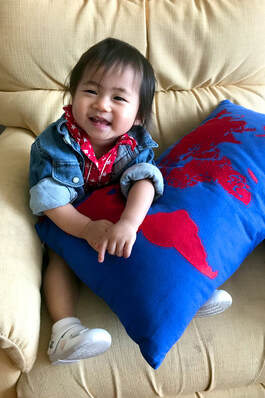|
"Children do not have to proof themselves to be loved as it is their parents' first responsibility to love them unconditionally"
(Ailin, after she becomes a mother: July 11, 2019) "A child who is accepted and well-loved will gain self-confidence and respect for themselves and others. It is the responsibilities of parents, teachers, and society at large to provide caring environment for every children to develop in a healthy and holistic way." (Ailin, based on her experiences as a teacher: 2012) "How adults perceive the world will depend mostly on how they are being treated as children. Children will learn how to care, trust, and have empathy if they also have been nurture and care by loving adults" (Ailin, based on her personal experiences of having loving parents: 2012). |
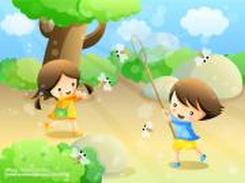
Why focusing on children?
My interest in early childhood education sparked when I volunteered to serve as a Sunday School teacher for about 7 years. I never would imagine that eventually I would consider to become an educator and children book's author until I cognitively realized and experienced the importance of early childhood education. Interacting with children is much simpler than interacting with adults because they are fun, loving, genuine, and innocent. In a nutshell, I can be stress free when I am around children. Children gives me energy and spirit to laugh at the most simple incidents. Once I learned about the complexity of children's socio-emotional, brain, and physical development, I was captivated by this fascinating field. Children are not just playing around or talking about different stuff, but their simple world is actually creating the foundation for their later years. Despite some innate characters that children have, there is so much room to grow and develop their various talents and abilities.
Infants (age 0 to 1) activities seems to be insignificant to adults because they are mostly crying, peeing, pooping, and/or eating. However, this very age is the time where their brain cells grow the most. Theories of attachment and bonding often start at this vital age of infancy. Infants need loving parents and caregivers to help them explore and understand this strange new world out of their mother's wombs. Through taking care of babies, talking to them, fulfilling their needs - whether feeding them, changing diapers, or simply touching them - adults can nurture young ones to grow physically and emotionally healthy.
My interest in early childhood education sparked when I volunteered to serve as a Sunday School teacher for about 7 years. I never would imagine that eventually I would consider to become an educator and children book's author until I cognitively realized and experienced the importance of early childhood education. Interacting with children is much simpler than interacting with adults because they are fun, loving, genuine, and innocent. In a nutshell, I can be stress free when I am around children. Children gives me energy and spirit to laugh at the most simple incidents. Once I learned about the complexity of children's socio-emotional, brain, and physical development, I was captivated by this fascinating field. Children are not just playing around or talking about different stuff, but their simple world is actually creating the foundation for their later years. Despite some innate characters that children have, there is so much room to grow and develop their various talents and abilities.
Infants (age 0 to 1) activities seems to be insignificant to adults because they are mostly crying, peeing, pooping, and/or eating. However, this very age is the time where their brain cells grow the most. Theories of attachment and bonding often start at this vital age of infancy. Infants need loving parents and caregivers to help them explore and understand this strange new world out of their mother's wombs. Through taking care of babies, talking to them, fulfilling their needs - whether feeding them, changing diapers, or simply touching them - adults can nurture young ones to grow physically and emotionally healthy.
A shared responsibility for parents and teachers
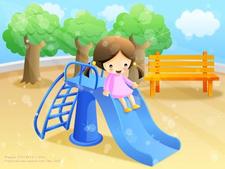
It is important for parents and teachers to share the responsibility to nurture and care for children. Once parents, teachers, or caregivers help infants, toddlers, and children at this critical age (0 to 5), it will give them a solid foundation for their academic performance as teenagers and young adults. Often times, society places a higher value on academic performance but the most crucial development children need to ripen is their socio-emotional wellbeing, which will be more difficult to change once they grow up.
Children learn by playing because while they play they learn how to interact with one another (social skills), they encounter problems that they need to solve (problem-solving abilities), how to cope with stressful situation (emotional skills), and they also continue to develop their gross and fine motor skill. Children's brain begin to mature in the process of playing and interacting with other children and adults. This is what Vyagotsky termed as the scaffolding stage and suggests that younger children who play with older children tend to learn faster, while the older children also become better as they see themselves as role model for the younger ones. During this critical age it is important for parents and teachers to cooperate closely to observe and meet children's needs.
The importance of reading to children
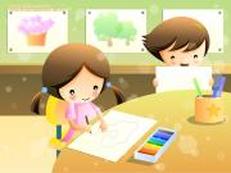
Children learn new vocabularies, abstract and practical concepts, and acquire mother tongue and foreign languages at a faster rate in comparison with adults. Reading to children becomes an important activity when attempting to expose them to new things. While reading to children, they will grasp the ideas that the pictures relate with the texts and this is the beginning of early literacy. It is important to introduce children with different stories through children books with simple languages and appealing illustrations. Children have their own interests and preferences in term of what type of stories they like. It is a good idea to offer different options of print-materials to children whether they are pop-up books, picture books, and even digital picture books. In choosing children book, look for the age appropriateness of the book (usually it is written in the back of the book). The younger the child's age, the fewer words and more pictures are necessary. When they grow a little older they can handle books with more words and less pictures and even chapter books later on when they reach the school age.
Story time is a wonderful moment not only for adults to introduce new vocabularies and concepts to them. The more children being read, the more they expand their vocabularies and their horizons of the world. If parents or caregivers happen to know more than one language, it never hurt to communicate with children in foreign languages. Present research shows that children who learn second or third languages before the age of 5 will speak it with no dialect. My first published children book, Venus the Global Child, was created to send a simple message of diversity and acceptance of an individual's unique identity while respecting others. There are many other children's books with different messages, some are educational and many of them are simply funny. Whatever type of children's book you choose for your child or your child chooses for his or herself, it is always good to expose them to early literacy. Keep in mind that reading to children can also be a perfect time to bond with them.
Story time is a wonderful moment not only for adults to introduce new vocabularies and concepts to them. The more children being read, the more they expand their vocabularies and their horizons of the world. If parents or caregivers happen to know more than one language, it never hurt to communicate with children in foreign languages. Present research shows that children who learn second or third languages before the age of 5 will speak it with no dialect. My first published children book, Venus the Global Child, was created to send a simple message of diversity and acceptance of an individual's unique identity while respecting others. There are many other children's books with different messages, some are educational and many of them are simply funny. Whatever type of children's book you choose for your child or your child chooses for his or herself, it is always good to expose them to early literacy. Keep in mind that reading to children can also be a perfect time to bond with them.
Learning through Play
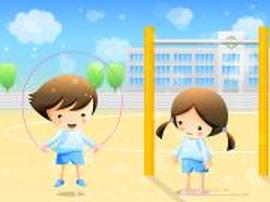
Children typically like to engage in activities of play. This is a developmentally appropriate activity as they learn so many different things during playtime. Children interact with other children when they play together and this builds their social skills, negotiation skills, conflict resolution skills, cooperation skills, and problem solving skills. Individual playtime also can be seen as an act of learning as children interact with toys and usually will learn how to create fun activities with it. Indoor and outdoor activities are both important environment to support play. The more a child receives stimulation from a rich play environment - like a home or a school with different toys or educational materials - the faster they will learn.
Children's young minds quickly absorb from everything that is provided around them. That is why even the type of conversation and role modeling from adults will be learned quickly by children. Children love to pretend play by wearing different costumes and imagining that they are certain professions, such as doctor, construction worker, artist, architect, dancer, and so forth. They also like to run around, jump, make noises, and more than anything they will try to test adults' boundaries. This is actually a very healthy development and if caregivers and parents guide children properly, they will flourish with self-confident about themselves as unique individuals. They will also have a proper perspective about the world around them. Children learn how to trust adults and their friends in the act of playing. There are formal and informal rules of each game and normally, children are really fast to pick up these rules. It is best to let children follow their genuine interests and continue to expose them to new things to stimulate a healthy development.
Children's young minds quickly absorb from everything that is provided around them. That is why even the type of conversation and role modeling from adults will be learned quickly by children. Children love to pretend play by wearing different costumes and imagining that they are certain professions, such as doctor, construction worker, artist, architect, dancer, and so forth. They also like to run around, jump, make noises, and more than anything they will try to test adults' boundaries. This is actually a very healthy development and if caregivers and parents guide children properly, they will flourish with self-confident about themselves as unique individuals. They will also have a proper perspective about the world around them. Children learn how to trust adults and their friends in the act of playing. There are formal and informal rules of each game and normally, children are really fast to pick up these rules. It is best to let children follow their genuine interests and continue to expose them to new things to stimulate a healthy development.
Early Childhood Development in a Nutshell
|
Emotional maturity
Social skills Language acquisition |
Brain development
Self-acceptance Positive influence |
Proper discipline
Loving guidance Role modeling from adults |
Learning through play
Gross motor development Sensory integration |
Healthy nutrition
Safe environment Exploration for new things |
Suggested further reading on Early Childhood Education
The Vital Touch: How Intimate Contact with Your Baby Leads to Happier, Healthier Development by Sharon Heller
Your Child's Growing Mind: Brain Development and Learning From Birth to Adolescence by Jane M. Healy
What's Going on in There? How the Brain and Mind Develop in the First Five Years of Life by Lise Eliot
Born for Love: Why Empathy is Essential and Endangered by Bruce D. Perry and Maia Szalavitz
The Whole-Brain Child: 12 Revolutionary Strategies to Nurture Your Child's Developing Mind by Daniel J. Siegel, M.D.
Sensory Integration and the Child by A. Jean Ayres
Nurture Shock: New Thinking about Children by Po Bronson and Ashley Merryman
Sign with your Baby - Baby Sign Language (ASL) by Joseph Garcia
Revisiting the Chinese Learner: Changing Contexts, Changing Education by Carol K.K. Chan and Nirmala Rao
Your Child's Growing Mind: Brain Development and Learning From Birth to Adolescence by Jane M. Healy
What's Going on in There? How the Brain and Mind Develop in the First Five Years of Life by Lise Eliot
Born for Love: Why Empathy is Essential and Endangered by Bruce D. Perry and Maia Szalavitz
The Whole-Brain Child: 12 Revolutionary Strategies to Nurture Your Child's Developing Mind by Daniel J. Siegel, M.D.
Sensory Integration and the Child by A. Jean Ayres
Nurture Shock: New Thinking about Children by Po Bronson and Ashley Merryman
Sign with your Baby - Baby Sign Language (ASL) by Joseph Garcia
Revisiting the Chinese Learner: Changing Contexts, Changing Education by Carol K.K. Chan and Nirmala Rao
Links to Other Websites related to Early Childhood Education
http://www.thebump.com
http://www.babycenter.com
http://www.pbskids.com
http://www.brainquest.com/kids/
http://halfthesky.org/en
http://developingchild.harvard.edu/
http://www.babycenter.com
http://www.pbskids.com
http://www.brainquest.com/kids/
http://halfthesky.org/en
http://developingchild.harvard.edu/
